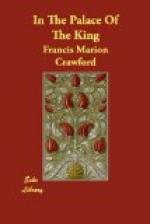The old man stopped short, and Dolores wondered vaguely what he had been going to say. Ruy Gomez was a very strange compound of almost childlike and most honourable simplicity, and of the experienced wisdom with regard to the truth of matters in which he was not concerned, which sometimes belongs to very honourable and simple men.
“You do not believe that my father is guilty,” said Dolores, boldly asserting what she suspected.
“My dear child,” answered Ruy Gomez, twisting his rings on his fingers as he spread his hands above the coals in the brazier, “I have lived in this court for fifty years, and I have learned in that time that where great matters are at stake those who do not know the whole truth are often greatly deceived by appearances. I know nothing of the real matter now, but it would not surprise me if a great change took place before to-morrow night. A man who has committed a crime so horrible as the one your father confessed before us all rarely finds it expedient to make such a confession, and a young girl, my dear, who has really been a little too imprudently in love with a royal Prince, would be a great deal too wise to make a dramatic statement of her fault to the assembled Grandees of Spain.”
He looked across at Dolores and smiled gently. But she only shook her head gravely in answer, though she wondered at what he said, and wondered, too, whether there might not be a great many persons in the court who thought as he did. She was silent, too, because it hurt her to talk when she could not draw breath without remembering that what she had lived for was lying dead in that dim room on the upper story.
The door opened, and a chamberlain entered the room.
“His Majesty is pleased to receive Dona Dolores de Mendoza, in private audience,” he said.
Ruy Gomez rose and led Dolores out into the corridor.
* * * * *
CHAPTER XVIII
Dolores had prepared no speech with which to appeal to the King, and she had not counted upon her own feelings towards him when she found herself in the room where Mendoza had been questioned, and heard the door closed behind her by the chamberlain who had announced her coming. She stood still a moment, dazzled by the brilliant lights after having been so long in the dimmer waiting room. She had never before been in the King’s study, and she had fancied it very different from what it really was when she had tried to picture to herself the coming interview. She had supposed the room small, sombre, littered with books and papers, and cold; it was, on the contrary, so spacious as to be almost a hall, it was brightly illuminated and warmed by the big wood fire. Magnificent tapestries covered the walls with glowing colour, and upon one of these, in barbaric bad taste, was hung a single great picture by Titian, Philip’s favourite master. Dolores




